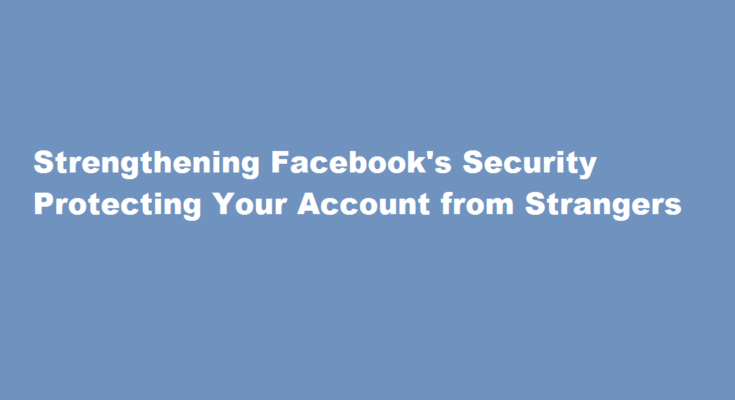Introduction
With over 2.8 billion monthly active users, Facebook remains one of the most popular social media platforms. However, the increased prevalence of cyber threats calls for extra measures to ensure the security of our personal information and interactions. In this article, we will explore effective strategies and best practices to safeguard your Facebook account from strangers, enhancing your privacy and overall online experience.
Create a Strong Password
A strong password is the first line of defense against unauthorized access. Avoid using obvious choices like “123456” or “password.” Instead, opt for a combination of uppercase and lowercase letters, numbers, and symbols. Longer passwords are harder to crack, so aim for a minimum of 12 characters. Additionally, refrain from using personal information, such as birthdays or names of family members, as these are easily guessable. Remember to update your password regularly to stay ahead of potential security risks.
Enable Two-Factor Authentication
Two-Factor Authentication (2FA) adds an extra layer of security to your Facebook account. By linking your account with a trusted device, such as your smartphone, you’ll receive a verification code each time you log in from an unrecognized device or location. This added step ensures that even if someone obtains your password, they will still need physical access to your secondary device. Enabling 2FA significantly reduces the chances of unauthorized individuals gaining access to your account.
Adjust Privacy Settings
Take control of your Facebook privacy by customizing your settings. Navigate to the Privacy Settings page and review each section carefully. Limit who can see your posts, photos, and personal information by choosing between “Public,” “Friends,” or “Only Me” options. It is advisable to restrict access to your posts and personal details strictly to friends or specific groups, rather than allowing public visibility. Regularly review your privacy settings to ensure they align with your desired level of privacy.
Be Cautious with Friend Requests
Exercise caution when accepting friend requests from individuals you do not know personally. Many cybercriminals use fake profiles to gain access to personal information. Verify the legitimacy of the profile by examining mutual friends, shared interests, or background information. If something seems suspicious, it is better to err on the side of caution and decline the request. Remember, accepting friend requests from strangers can expose your private posts and personal information to potentially malicious individuals.
Secure Your Email Account
Your email account is often the gateway to all your online accounts, including Facebook. Protect it with a strong, unique password and enable two-factor authentication if available. Regularly check for suspicious activities, such as unrecognized login attempts or unusual email conversations. In the event of a compromised email account, hackers can easily request password resets for various online services, including Facebook. By keeping your email account secure, you fortify the barriers against unauthorized access to your Facebook profile.
Stay Informed about Security Updates
Facebook frequently updates its security features and implements new measures to counter emerging threats. Stay informed by regularly visiting the official Facebook Security page, where the latest security news and recommendations are provided. Additionally, consider subscribing to security blogs or newsletters to receive timely updates and expert advice on online security practices. By staying abreast of the latest security developments, you can proactively safeguard your Facebook account against evolving threats.
FREQUENTLY ASKED QUESTIONS
How do strangers find me on Facebook?
If someone searches using your email address and it includes your full name, the search results may show your profile. You control who can see your mobile phone number or email on your profile separately. If you’re sharing your phone number or email on your profile with your friends, they can see it.
Can strangers see my Facebook profile?
Anyone can see your public information, which includes your name, profile picture, cover photo, gender, username, user ID (account number), and networks (learn why). Only you and your friends can post to your profile. When you post something, you can control who sees it by using the audience selector.
Conclusion
In an increasingly interconnected world, securing our online presence is crucial. By following these practical guidelines, you can significantly enhance the security of your Facebook account and protect your personal information from strangers.
Remember to create a strong password, enable two-factor authentication, customize privacy settings, be cautious with friend requests, secure your email account, and stay informed about security updates. By taking these steps, you can enjoy a safer and more secure experience on Facebook.
Read Also : Safeguarding Your Instagram Account Essential Tips for Enhanced Security



